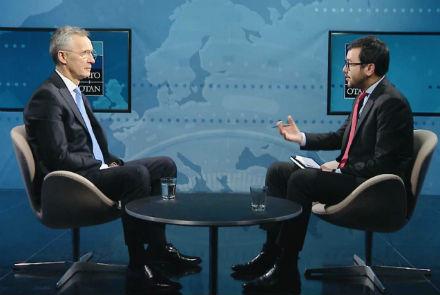NATO Secretary General Jens Stoltenberg said on Thursday night that NATO and the United States’ presence in Afghanistan over the past 18 years has not only helped fight terrorist groups but it has also provided security in order to support Afghans to create the conditions for social and economic development.
Speaking to TOLOnews’ Lotfullah Najafizada in Brussels following the defense ministers meeting, Stoltenberg said NATO’s presence in Afghanistan has paved the ground for Afghanistan to never again become a safe haven or breeding ground for international terrorism.
He said NATO’s presence and the presence of the United States has been key in the fight against terrorist groups, such as Daesh and Al Qaeda.
“So, we have achieved a lot both on the battlefield and also by providing security supporting the Afghans and created the conditions for social and economic development,” he said.
Asked whether a political settlement was the only option for Afghanistan Stoltenberg said it was.
“At the end, that’s the only option because of course at some stage it’s important to have peace, to have a political solution, so NATO’s military presence, the reason for our military presence is to create the conditions for a political solution, sending a signal that the Taliban won’t win on the battlefield and (will) have to sit down and negotiate at the negotiating table and that’s exactly what we have done,” he said.
He said NATO is in the country to create conditions for successful talks but that no one can tell whether the talks will succeed this time.
He again said NATO is committed to Afghanistan and that this was a very clear message from all the allies at the NATO defense ministerial meeting on Thursday that they would “continue to provide support, train, assist and advice, but also with funding”.
“We have to remember that we actually committed to continue to fund Afghan army and security forces until 2024.
“We made that decision at the summit in July. So, we are committed to Afghanistan and at the same time we are working for a peaceful negotiated political solution.”
Questioned on what the country and the people would face in the event of the Taliban returning, Stoltenberg said: “NATO’s presence in Afghanistan has helped to facilitate enormous social and economic progress, least for women.
“Back in 2001, hardly any girls attended school and now millions of girls are attending schools. And this Afghan constitution protects the rights of also women of course,” he said.
On whether he thought these achievements were at risk, Stoltenberg said the preservation of gains was important for NATO.
“These gains we have been making together with Afghans and of course we want do whatever we can to preserve these gains. But what we need now is an Afghan reconciliation, an Afghan agreement.”
Asked whether a “compromise” would be considered, Stoltenberg responded that the decision is in the hands of the Afghan people.
“At the end of the day, it has to be Afghans that own and decide on this process. At the end of the day, it cannot be NATO or Brussels, or Washington, or other NATO allies to decide on how the Afghans are going to develop their future,” he said.
On whether there was the chance of a return of the Islamic Emirate – the Taliban – Stoltenberg did not answer directly but said a strong democratic process has been installed in Afghanistan over the past 18 years.
He said support has been provided to establish, modernize and strengthen Afghan institutions and Afghan security forces have been trained to take responsible for their own security.
Questioned on whether there were concerns about Russia’s engagement in the Afghan peace process, Stoltenberg said: “I think it’s important that we all support an Afghan led and Afghan owned process and we support talks which are conducted by (US special envoy) Ambassador Khalilzad with the Taliban.
“And it remains to be seen whether the meetings in Moscow help or support that process because we need to support that process which leads to an Afghan reconciliation.”
Stoltenberg said however that all other countries in the region, including neighbors and other stakeholders, and Russia, need to support the efforts of Khalilzad to create the conditions for an Afghan reconciliation process which includes the Afghan government.


